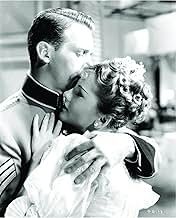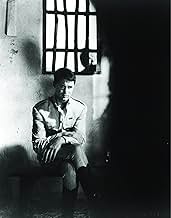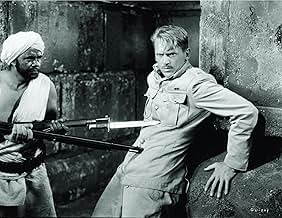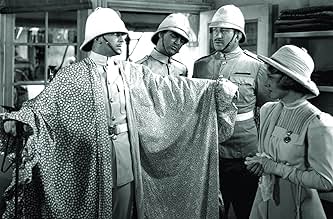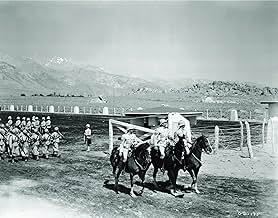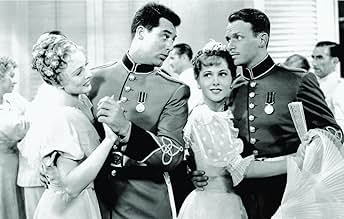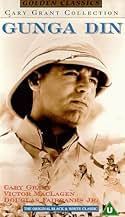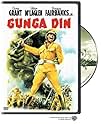PUNTUACIÓN EN IMDb
7,2/10
13 mil
TU PUNTUACIÓN
En la India del siglo XIX, tres soldados británicos y un aguador nativo deben detener un renacimiento masivo secreto del culto asesino thuggee antes de que pueda arrasar la tierra.En la India del siglo XIX, tres soldados británicos y un aguador nativo deben detener un renacimiento masivo secreto del culto asesino thuggee antes de que pueda arrasar la tierra.En la India del siglo XIX, tres soldados británicos y un aguador nativo deben detener un renacimiento masivo secreto del culto asesino thuggee antes de que pueda arrasar la tierra.
- Premios
- 1 premio en total
Charles Bennett
- Telegraph Operator
- (sin acreditar)
Gene Coogan
- Lancer
- (sin acreditar)
Jimmy Dime
- Thug
- (sin acreditar)
George Du Count
- Pandu Lal
- (sin acreditar)
Anna May the Elephant
- Elephant
- (sin acreditar)
Argumento
¿Sabías que...?
- CuriosidadesThe gong in the title sequence is the same one used to summon King Kong six years earlier.
- PifiasBallantine and MacChesney are bound and gagged when the last Thuggee is about to behead them after Gunga Din sounds the alarm. Cutter shoots the Thuggee and Ballantine and MacChesney are unbound as they rush to Cutter's side.
- Créditos adicionalesThe credits appear on a gong. Standing next to the gong is a Hindu man, and every time he strikes the gong, the credits change.
- Versiones alternativasGerman theatrical version was cut by approx. 12 minutes. This version was later shown on TV but never released on any home media format. Only in 2018 the film was released on DVD, with approx. 4 minutes restored.
- ConexionesFeatured in Mirando hacia atrás con ira (1959)
Reseña destacada
While it is fashionable in too many circles to condemn anything which portrays European colonialism generally, and the British Empire specifically, in a favorable light, a little historical knowledge will show that Kipling's story, as well as this superb film, are hardly the reactionary racist screed some would like to demote them to. Gunga Din is a regimental bhisti - a water carrier - and in 19th century India that meant that he had a job which guaranteed a place to sleep and food in a very brutal society. Considering that he was also an "untouchable" - a member of India's lowest caste - this was something. Colonel Weed is correct in saying "he had no official status as a soldier" - bhistis were non-military auxiliaries. As for his loyalty to the British, there were many Indians who clearly preferred British rule to that of their fellows - and not just the maharajas and princes.
If you read the story - and watch the movie with an objective eye - at the end, all the major characters have nothing but respect for Gunga Din. Sergeant MacChesney (Victor McLaglen) is clearly shamed by the fact that Din, in the end, was not only the better soldier but the better man - he sacrificed himself to prevent the ambush and massacre of the British column. The most telling example that the movie doesn't "put down" Gunga Din is at the end when Colonel Weed posthumously appoints the former regimental bhisti as a Corporal in the regiment. Corporal was a BRITISH rank - the equivalent Indian rank was Havildar. So, he was appointed as a BRITISH non-commissioned officer who could command British troops - hardly an example of political incorrectness.
Yes, this is "men-as-buddies" flick. However, this movie has a special appeal to anyone who has actually served in the military - those are the types of friendships you make (you'll share your last drop of water with your mess mate) and keep for the rest of your days. It acknowledges that. So enjoy it - it is a rousing tale - and keep the PC-nonsense out of it. The bad guys lose in the end while the best man is recognized for his virtues - you don't even get that it in real life.
If you read the story - and watch the movie with an objective eye - at the end, all the major characters have nothing but respect for Gunga Din. Sergeant MacChesney (Victor McLaglen) is clearly shamed by the fact that Din, in the end, was not only the better soldier but the better man - he sacrificed himself to prevent the ambush and massacre of the British column. The most telling example that the movie doesn't "put down" Gunga Din is at the end when Colonel Weed posthumously appoints the former regimental bhisti as a Corporal in the regiment. Corporal was a BRITISH rank - the equivalent Indian rank was Havildar. So, he was appointed as a BRITISH non-commissioned officer who could command British troops - hardly an example of political incorrectness.
Yes, this is "men-as-buddies" flick. However, this movie has a special appeal to anyone who has actually served in the military - those are the types of friendships you make (you'll share your last drop of water with your mess mate) and keep for the rest of your days. It acknowledges that. So enjoy it - it is a rousing tale - and keep the PC-nonsense out of it. The bad guys lose in the end while the best man is recognized for his virtues - you don't even get that it in real life.
- hundd44
- 11 may 2003
- Enlace permanente
Selecciones populares
Inicia sesión para calificar y añadir a tu lista para recibir recomendaciones personalizadas
- How long is Gunga Din?Con tecnología de Alexa
Detalles
- Fecha de lanzamiento
- País de origen
- Idioma
- Títulos en diferentes países
- Aufstand in Sidi Hakim
- Localizaciones del rodaje
- Empresa productora
- Ver más compañías en los créditos en IMDbPro
Taquilla
- Presupuesto
- 1.910.000 US$ (estimación)
- Duración1 hora 57 minutos
- Color
- Relación de aspecto
- 1.37 : 1
Contribuir a esta página
Sugerir un cambio o añadir el contenido que falta



